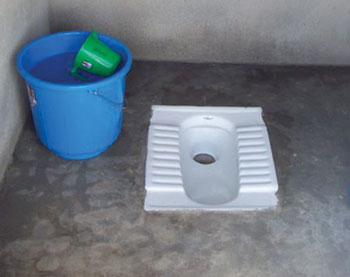If the rest of the country was like Bhageswor, Nepal wouldn’t be a least developed country anymore

PICS: KUNDA DIXIT
PROUD MOMENT: Bhageswor village in Achham has declared itself open-defecation free as well as free from the practice of Chhaupadi because of campaigners like Sabitri Batala, Janaki Bohora and Laxmi Sharma (left). “I am not satisfied that my village is Chhaupadi-free when women in my parent’s village still practice it,” says Batala.
After returning from a recent trip to far-western Nepal, people in Kathmandu asked me what I was doing there. Covering
Achham district being declared
open-defecation free, I replied, amidst sniggers and an eruption of scatological jokes.
Yet, building latrines and persuading people to use them can be a matter of life or death in a country where at least five children die every day of diarrohoeal dehydration. Once regarded as backward and under-developed, Achham and Kalikot have become the latest two districts where people don’t have to defecate in the open anymore. The same can’t be said of Kathmandu yet.
Walking across the arid and rugged mountains of western Nepal 30 years ago, I used to be powerfully reminded every step of the way of the famous Nepali saying “gu ayo gau ayo”. As we approached every village, the trails would be mined with human faeces.
Three decades later, climbing down from the Mangalsen-Doti Highway to the village of Bhageswor is a pleasant walk through a community forest dotted with berry bushes and scented with spring flowers. Not only is it defecation-free, there isn’t the litter of plastic noodle wrappings that now deface trails across Nepal.
“If you came here five years ago, you wouldn’t be able to breathe or walk along this stream,” recalled Ratan Bohara, as he walked us to his village.
Faecal contamination of water supply meant that till as recently as three years ago, cholera epidemics were common. Diarrhoea was the number one health problem for the children of Bhageswor. Today it ranks 12th.
The same community mobilisation that allowed Bhageswor to stop open-defecation has also made it the first village to be free of ‘Chhaupadi’, a traditional practice that banishes women to the cow shed during their periods and childbirth. It is also one of the first villages in Nepal to have 100 per cent school enrolment, full-vaccination coverage for all children, the village has eliminated acute malnutrition, child marriage, and domestic violence.
If Bhageswor could be scaled up to the national level, Nepal would no longer be a least-developed country. Even more remarkable is that the village is located in Achham, the district with one of the lowest female literacy and life expectancy rates in Nepal.
A lot of the credit goes to Bhageswor’s women who have taken the lead in mobilising households through mother’s groups, female health volunteers, and a paralegal assistance unit. Nearly half of all young men in Achham are migrant workers in India and increasingly the Gulf, so the women have taken charge.
What clicked in Bhageswor when surrounding VDCs still practice Chhaupadi and have made less headway in promoting health and sanitation? The answer comes in a gathering under the village pipal tree. Despite political and class differences one gets the sense of a unity of purpose and in the absence of local elections there is performance-based accountability – both qualities sorely lacking in the national discourse in Kathmandu.
Now that Bhageswor will meet the criteria for Child Friendly Local Governance, the village meeting is charting out a strategy for a higher standard of education, more reliable health care, improved water supply, increasing household income through skills training, better quality latrines where effluent can be used as fertiliser.
“The reason Bhageswor succeeded where others haven’t is that the women here decided to involve the men in changing attitudes,” explains UNICEF’s Manju Wagle, “once the mindset of the men changed there was no problem for the women to take the lead.”
Indeed, at the village meeting the most forceful speakers are women like Sabitri Batala, who as a girl found it hardest to convince her own mother that Chhaupadi was a superstitious practice. “I had to tell her, look, I don’t go to the cow shed when I have periods yet our buffalo hasn’t died, our crops haven’t been raided by wild animals, the gods haven’t punished us,” she tells us. “But I am not satisfied that my village is Chhaupadi-free when women in my parent’s village still practice it.”
The people of Bhageswor realise that turning one village around is not enough. Achham being declared open-defecation free doesn’t mean much as long as water is scarce and contaminated, women are still banished to cow sheds every month.
Still, Achham and Kalikot could shame other districts to also declare themselves open-defecation free so the country can meet the target of latrines for all by 2017.
Documentary ‘In Nepal, exiled each month’ by The New York Times
Read also:
Save the children
Resurrection Achham
Toilets for all ASAP
Making cities child-friendly
4 in 10 Nepalis defecate in the open

**72% have telephone
**62% have latrine
Five key hygiene and sanitation behaviours

**Use of toilets
**Hand washing with soap
**Safe handling and treatment of drinking water
**Personal hygiene (nail cutting, bathing, cloth washing, tooth brushing)
**Proper solid and liquid management